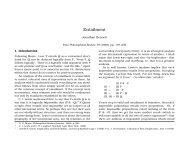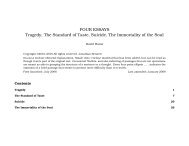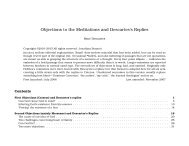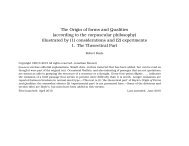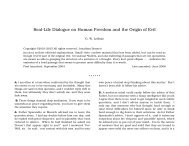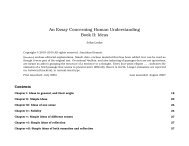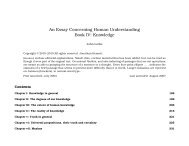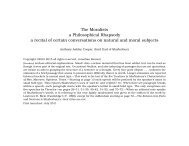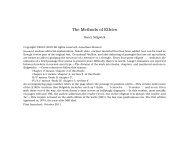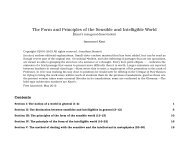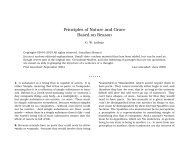A Vindication of the Rights of Woman with - Early Modern Texts
A Vindication of the Rights of Woman with - Early Modern Texts
A Vindication of the Rights of Woman with - Early Modern Texts
Create successful ePaper yourself
Turn your PDF publications into a flip-book with our unique Google optimized e-Paper software.
The <strong>Rights</strong> <strong>of</strong> <strong>Woman</strong> Mary Wollstonecraft 12: National education<br />
It is <strong>the</strong> irregular exercise <strong>of</strong> parental authority that<br />
first injures <strong>the</strong> mind, and girls are more subject to <strong>the</strong>se<br />
irregularities than boys are. The will <strong>of</strong> those who never<br />
allow <strong>the</strong>ir will to be disputed except when <strong>the</strong>y happen to<br />
be in a good mood is almost always unreasonable. [MW<br />
describes and deplores <strong>the</strong> tricks that little girls practice in<br />
order to cope <strong>with</strong> this kind <strong>of</strong> parental authority. Then:]<br />
I have been led into a melancholy train <strong>of</strong> reflection about<br />
females, concluding that when <strong>the</strong>ir first affection must •lead<br />
<strong>the</strong>m astray or •make <strong>the</strong>ir duties clash until <strong>the</strong>y rest on<br />
mere whims and customs, little can be expected from <strong>the</strong>m<br />
as <strong>the</strong>y grow older. How indeed can an instructor remedy<br />
this evil? for to teach children virtue on any solid principle<br />
is to teach <strong>the</strong>m to despise <strong>the</strong>ir parents. Children ought<br />
not to be taught to make allowance for <strong>the</strong>ir parents’ faults,<br />
because every such allowance weakens <strong>the</strong> force <strong>of</strong> reason<br />
in <strong>the</strong>ir minds, and makes <strong>the</strong>m still more indulgent to <strong>the</strong>ir<br />
The good effects <strong>of</strong> private education will always be very<br />
limited; <strong>the</strong> parent who really puts his own hand to <strong>the</strong><br />
plough will always be somewhat disappointed until education<br />
becomes a grand national concern. A man can’t retire into<br />
a desert <strong>with</strong> his child; and if he did, he couldn’t bring<br />
himself back to childhood and become <strong>the</strong> proper friend and<br />
playmate <strong>of</strong> an infant or youth. When children are confined<br />
to <strong>the</strong> society <strong>of</strong> men and women, <strong>the</strong>y soon acquire a kind <strong>of</strong><br />
Chapter 12:<br />
National education<br />
93<br />
own faults. It is a sublime virtue <strong>of</strong> maturity that leads<br />
us to be hard on ourselves and forbearing towards o<strong>the</strong>rs;<br />
but children should be taught only <strong>the</strong> simple virtues, for if<br />
<strong>the</strong>y begin too early to make allowance for human passions<br />
and manners, <strong>the</strong>y’ll wear <strong>of</strong>f <strong>the</strong> fine edge <strong>of</strong> <strong>the</strong> criterion by<br />
which <strong>the</strong>y should regulate <strong>the</strong>ir own. . . . [A few years before this<br />
was written, Mary Wollstonecraft had been governess to <strong>the</strong> children <strong>of</strong><br />
Lord and Lady Kingsborough. Many facts could help to explain why her<br />
relationship <strong>with</strong> Lady Kingsborough went sour, so that eventually she<br />
was dismissed; <strong>the</strong> content <strong>of</strong> this paragraph may be part <strong>of</strong> <strong>the</strong> story!<br />
There is ano<strong>the</strong>r side-light on it on page 98.]<br />
The affections <strong>of</strong> children and weak people are always<br />
selfish: <strong>the</strong>y love <strong>the</strong>ir relatives because <strong>the</strong>y are loved by<br />
<strong>the</strong>m, not because <strong>of</strong> <strong>the</strong>ir virtues. But until esteem and<br />
love are blended toge<strong>the</strong>r in <strong>the</strong> •first affection, and reason<br />
is made <strong>the</strong> basis for <strong>the</strong> •first duty, morality will stumble at<br />
<strong>the</strong> threshold. . . .<br />
premature manhood that stops <strong>the</strong> growth <strong>of</strong> every vigorous<br />
power <strong>of</strong> mind or body. In order to develop <strong>the</strong>ir faculties<br />
<strong>the</strong>y should be stimulated to think for <strong>the</strong>mselves; and this<br />
can be done only by mixing a number <strong>of</strong> children toge<strong>the</strong>r<br />
and making <strong>the</strong>m jointly pursue <strong>the</strong> same objects.<br />
[MW continues <strong>with</strong> this <strong>the</strong>me. •If children are to be<br />
openly inquiring <strong>the</strong>y need time <strong>with</strong> <strong>the</strong>ir peers ra<strong>the</strong>r than<br />
<strong>with</strong> parents who stand—however wisely—in authority over



